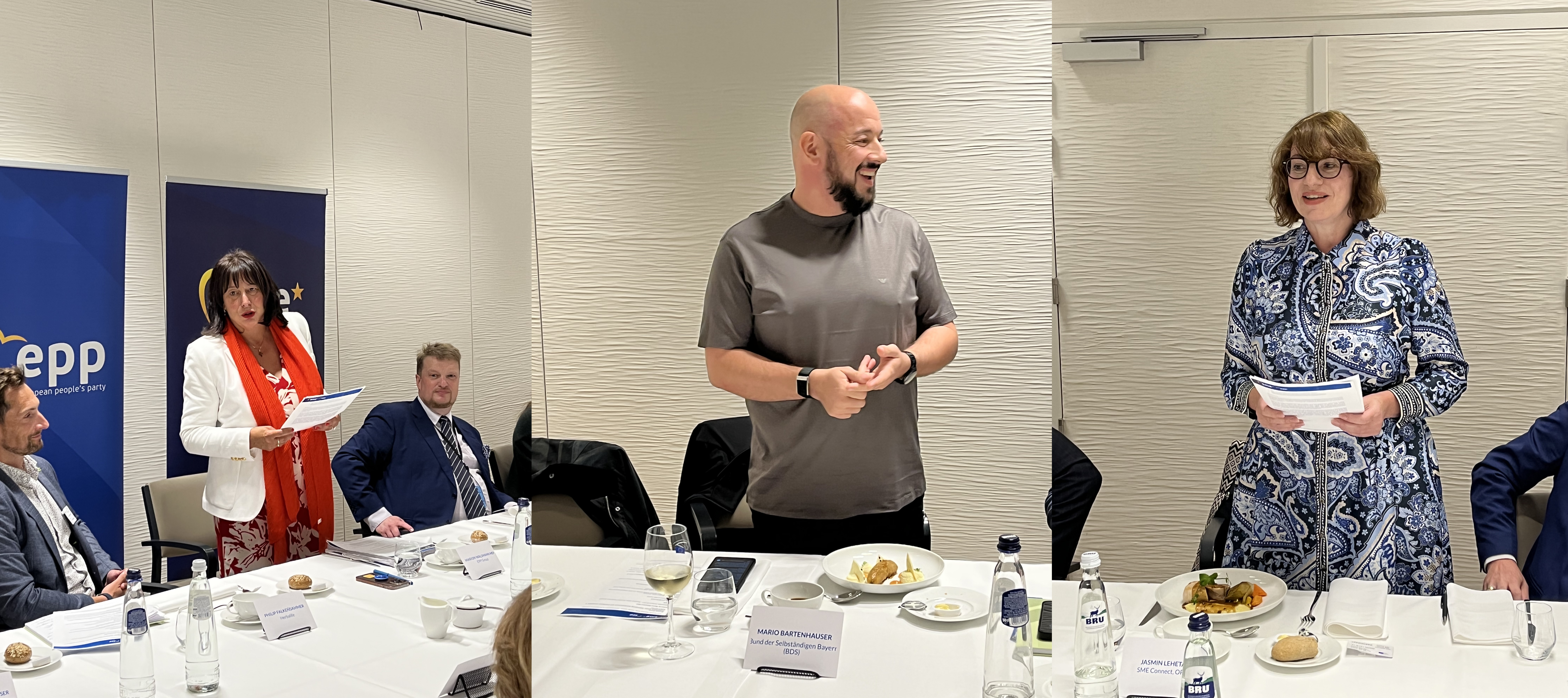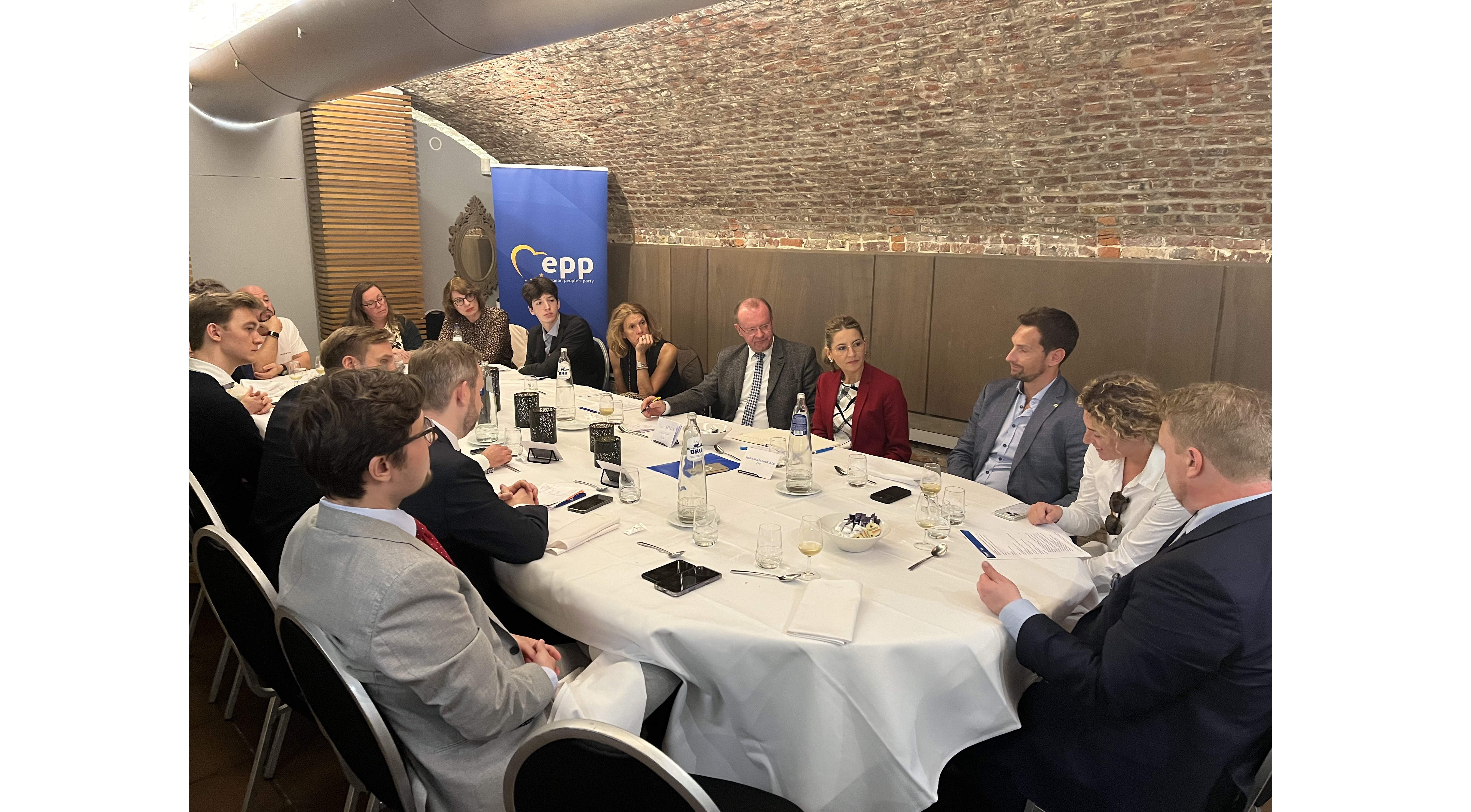OPC Summit: Standing alone, moving together: self-employment as the backbone of Europe

On 30 September and 1 October 2025, SME Connect, in partnership with SME Europe, organised the OPC Summit 2025 under the theme “Standing Alone, Moving Together: Self-Employment as the Backbone of Europe”.
With 60% of all SMEs consisting of one-person companies and over 32 million Europeans—about 14% percent of the total workforce—working as self-employed, this group represents the power cells of Europe’s entrepreneurial fabric. The OPC Summit aimed to give them a stronger voice, foster mutual understanding between policymakers and independent professionals, and develop pathways toward fairer, more effective support frameworks for self-employment.
The two-day Summit in Brussels brought together entrepreneurs, policymakers, and experts to highlight the realities, challenges, and potential of One-Person Companies (OPCs) and the self-employed across Europe. Co-hosted by ANGELIKA WINZIG MEP, Vice-President of SME Europe, Board Member of SME Connect, and TOMÁŠ ZDECHOVSKÝ MEP, member of the IMCO Committee in the European Parliament, the summit served as a forum for direct dialogue between practitioners and decision-makers at the EU level.
The programme commenced with a delegation of entrepreneurs visiting Google’s headquarters in Brussels, where they examined how AI, digital advertising, and cybersecurity are transforming Europe’s business landscape.
In the afternoon, the delegation met with representatives of the European Economic and Social Committee (EESC) for a focused dialogue on reducing bureaucracy and simplifying administrative procedures. MILENA ANGELOVA, member of the EESC, and MARKUS PIEPER, former MEP and current advisor to the Committee, led a constructive exchange on how better cooperation between institutions and business associations can ease the burden of compliance for one-person companies and for the self-employed.
The “SMEs Talk to Europe” session, held later that day, featured PETER DOHR, Senior Expert for the Single Market at the Austrian Chamber of Commerce (WKO), who described one-person companies as an indispensable pillar of Europe’s economy. He explained how the Chamber supports self-employed professionals through advocacy, training, and advisory services, and how such structures can help OPCs navigate evolving regulatory, digital, and market challenges.
The evening session, “Independent Voices: Empowering Self-Employment and One-Person Companies in Today’s Europe,” hosted by MARION WALSMANN MEP, focused on empowering and recognising OPCs and self-employed professionals.

MARION WALSMANN MEP, Chair of the SME Circle, Board Member of SME Europe and Chair of the Parlamentarischer Arbeitskreis Mittelstand, highlighted the vital contribution of self-employed professionals and one-person companies, which represent around 60% of Europe’s SMEs and operate across every sector, yet often remain under-recognised and face unnecessary administrative and regulatory burdens. She called for simpler digital procedures and stronger dialogue between policymakers and entrepreneurs to ensure fair participation and better framework conditions for independent businesses in an innovation-driven economy.
JASMIN LEHETA, Styling & Interior Coach, Co-chair of the SME Connect Working Group on Entrepreneurship, Self-Employment and OPCs, urged participants to strengthen the voice of Europe’s one-person companies and self-employed professionals—stylists, therapists, writers, designers, and many others—who remain politically underrepresented. Drawing on her own entrepreneurial experience, she described the realities of self-employment and underlined SME Connect’s role in promoting knowledge exchange, and enabling dialogue between entrepreneurs and policymakers.
KERSTIN KELLIS, OPC Alternative Practitioner for Psychotherapy, illustrated the challenges faced by OPCs and the self-employed, noting that policies designed for larger corporations often trickle down, creating unforeseen administrative burdens and limiting their ability to serve clients effectively. She argued that policymakers should recognize OPCs as vital contributors to the economy, deserving proportionate regulation, clearer communication, and more direct inclusion in decision-making processes.
PHILIP FALKENSAMMER, Herbalife Distributor in Germany, shared his journey as an independent entrepreneur and the challenges of starting and growing a business—navigating taxes, advertising costs, and complex regulations—while balancing family responsibilities. He emphasized the benefits of self-employment, including time leverage, pursuit of passion, and family support, and stressed the importance of fostering entrepreneurial skills, teaching financial and time management to the next generation.
MARIO BARTENHAUSER, Digital Marketing Entrepreneur, discussed the difficulties OPCs and SMEs face in navigating complex and often inaccessible EU regulations such as the Digital Services Act, the AI Act, and accessibility laws. Drawing on his experience in digitalization and ventures in marketing and spirits production, he called for clear, accessible information and proposed a centralized platform to make rules understandable and actionable.
DIETER GROHMANN, Freelancer and Artist, highlighted the unique contributions of one-person companies to European creative and business landscapes, illustrating how they provide jobs, foster innovation, and deliver projects across borders. He emphasized the restrictive effects of rigid regulations on entrepreneurial freedom, describing OPCs as agile “small boats in a big ocean” and advocating for policies that preserve flexibility, recognize their value, and enable them to operate without bureaucratic obstacles.
The morning panel, titled “Shaping the Future of OPCs and Self-Employment,” was opened by TOMÁŠ ZDECHOVSKÝ MEP, who underlined the importance of direct engagement between legislators and entrepreneurs. Drawing on his own background as a business founder, he stressed that reducing bureaucracy, strengthening cross-border cooperation, and ensuring legal certainty are essential to creating a stable environment for small enterprises to thrive.

NIELS FLEMMING HANSEN MEP drew attention to the vital yet often overlooked role of individual entrepreneurs—the largest business group in Europe—and acknowledged SME Connect’s leadership in championing their interests. He stressed the urgency of advancing digitalisation and simplifying business procedures, praised effective cross-party cooperation between Conservatives and Greens on entrepreneurship and the green transition in Denmark.
LUDGER ODENTHAL, Policy Officer at DG GROW, European Commission, presented ongoing EU initiatives to support self-employed workers and SMEs, such as the Erasmus for Young Entrepreneurs programme, the Enterprise Europe Network, and the Startup and Scaleup Initiative. He highlighted continued efforts to reduce administrative burdens, ease access to finance and procurement opportunities, and strengthen the single market—while acknowledging that further work is needed to meet the needs of smaller firms.
MICHAEL LAUB, District Chairman of Bund der Selbständigen Bayern and Founder of Immobilienexpertenbüro Laub, stressed that one-person companies form the backbone of Europe’s SME landscape and urged policymakers to provide legal certainty, simplify procedures, and exempt small operators from excessive regulation, arguing that self-employment is a valuable career choice deserving recognition, freedom, and fair treatment rather than overregulation.
IMELDA VITAL, Executive Director of Seldia – The European Direct Selling Association, underscored the significance of the direct selling sector, representing over 5 million self-employed individuals and one-person businesses across Europe. She noted its contribution to flexible income opportunities, skills development, and women’s economic empowerment, and called on legislators to improve visibility, recognition, and support for the sector—not only through deregulation, but also through incentives, information exchange, and best-practice sharing to foster sustainable self-employment.
GLEN HODGSON, Secretary General of the Freelance Movement and SME Connect Special Advisor for the Platform Economy and Future of Work, reminded the audience that freelancers and one-person businesses form a vital yet frequently underestimated part of the European economy. Representing professionals ranging from therapists and coaches to IT experts and creatives, he urged policymakers to safeguard freedom, flexibility, and choice in work. He also stressed that legislation—such as the Platform Work Directive—must respect self-employment, embrace technological innovation, and keep solopreneurs at the centre of Europe’s economic and labour policy agenda.
VLADIMIR PREBILIČ MEP shared insights from his experience as a former mayor in Slovenia, where he implemented a low-bureaucracy local funding scheme that successfully supported new entrepreneurs and created sustainable jobs. He emphasised the importance of empowering municipalities and regions to directly assist SMEs, recognised the creativity of entrepreneurs, and highlighted the wider benefits of enabling people to work where they live—reducing commuting, protecting the environment, and improving quality of life. He encouraged EU policymakers to think “outside the box” when designing future SME initiatives.
GIORGIA CALVARESI, a young freelancer, reflected on her first year of self-employment and described the obstacles young professionals encounter. She pointed out that freelancing remains widely misunderstood, often perceived as less secure than traditional employment, and noted the lack of education and guidance on self-employment. She also raised concerns about practical barriers such as upfront tax payments in Italy, limited awareness of EU opportunities, and the absence of networks for freelancers. Calvaresi advocated for clearer guidance, better education, and structured mechanisms to promote cross-border freelancing and meaningful dialogue at the European level.
After the morning session, the delegation attended a presentation by ANDY WEBER, Head of Staff for MEP Angelika Winzig & Coordinator of the Austrian EPP-Delegation, on the European Parliament’s structure and role. This was followed by “SMEs Talk International,” where LILIA HEITZ, Secretary General of SME Global, discussed the importance of international cooperation and cross-border opportunities for independent entrepreneurs amid global competition and digital transformation.
The final debate “How Can the EU Better Address Its Political Messages to OPCs and the Self-Employed?”, brought together experts and political leaders to examine how communication between EU institutions and entrepreneurs can be improved.

THOMAS THALER, Thought Leader and Expert in EU Public Affairs and Government Relations, stressed the need to distinguish one-person companies from larger SMEs, urging the use of the full term “One-Person Companies” in EU legislation. He proposed a “28th regime” — a unified legal framework that would enable OPCs to operate seamlessly across the single market, eliminating legal fragmentation.
FRÉDÉRIEK VERMEULEN, Secretary-General and Political Director of CD&V, argued that Europe must rediscover its trust in citizens and small businesses. He proposed a more human approach to policymaking, advocating for simpler laws, better coordination, and a rule of thumb he called the “pizza rule,” meaning every EU law should be short enough to read before a pizza finishes baking.
PETER HEFELE, Policy Director at the Wilfried Martens Centre for European Studies, pointed out that EU communication often fails because it is overly technical and disconnected from local realities. He recommended working through chambers of commerce and local associations, which understand entrepreneurs’ needs, and cautioned against creating new institutions instead of revitalising existing ones.
MARÍA MOLINA HURTADO, Director of Political Affairs and Stakeholder Outreach for the European People’s Party, emphasised that EU institutions must move beyond the Brussels bubble and reach entrepreneurs where they live and work. She identified simplification, access to finance, and improved digital tools as top priorities, warning that every hour spent on paperwork is an hour lost to innovation.
Entrepreneurs in the audience echoed these concerns, describing the constant flow of new regulations as overwhelming and counterproductive. The summit also underlined the importance of the Omnibus framework and other simplification measures to support digitalisation and inclusion of the smallest entrepreneurs. Some participants warned that slow digital progress and excessive regulation are driving innovators out of Europe, creating a worrying “brain drain”. LILIA HEITZ from SME Global of the IDU, called for policymakers to use empathetic communication tools, such as personas and real-life examples, to design more human-centred legislation. She urged for ongoing, accessible dialogue rather than sporadic consultations, ensuring that communication between the EU and entrepreneurs remains active and mutual.
In his closing remarks, HORST HEITZ, Chair of the Steering Committee of SME Connect, praised the constructive and forward-looking tone of the discussions. He reiterated that one-person companies and the self-employed form the backbone of Europe’s economy and must be recognised as such in policy design and implementation.
The OPC Summit 2025 concluded that self-employed professionals and one-person companies are vital to Europe’s resilience, competitiveness, and innovation, yet remain underrepresented in policymaking. Participants stressed that empowering these entrepreneurs through fair regulation, access to finance, and digital transformation is key to Europe’s future prosperity. Translating these discussions into concrete policies will help ensure that small enterprises continue driving innovation and opportunity.